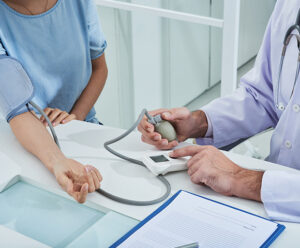
Expert General Physician & Hypertension Specialist
This page is your reliable source for understanding high blood pressure (hypertension) — curated by Dr. Ravi Kiran, General Physician at ONUS Robotic Hospitals. Whether you’re newly diagnosed, on treatment, or aiming for prevention, this page will guide you with evidence-based education.
🧠 What Is Hypertension?
Hypertension is a condition where the force of blood against artery walls is consistently too high, increasing the risk of heart disease, stroke, kidney damage, and more.
Normal Blood Pressure: Less than 120/80 mmHg
Hypertension: Repeated readings of 140/90 mmHg or higher
Types of Hypertension
Primary (Essential): Most common, no identifiable cause
Secondary: Caused by underlying conditions (thyroid, kidney issues, sleep apnea)
Why It Matters
Hypertension is called the “silent killer” because it often shows no symptoms but causes serious complications like:
Heart attacks
Stroke
Kidney failure
Vision loss
Memory problems
Common Myths & Facts
| Myth | Fact |
|---|---|
| “I feel fine, so my BP must be normal.” | Hypertension often has no symptoms. |
| “Only older people get high BP.” | It can affect people of all ages. |
| “Once on medication, it’s for life.” | With lifestyle changes, many reduce or stop meds. |
| “Salt is the only culprit.” | Stress, weight, sleep, alcohol, and inactivity matter too. |
🩺 How Is BP Measured & Diagnosed?
- Measured using a sphygmomanometer (digital/manual BP device)
- Average of multiple readings over different days is needed
- May need ambulatory BP monitoring in some cases
Risk Factors
Obesity or overweight
Sedentary lifestyle
High salt and low potassium diet
Stress, anxiety, poor sleep
Alcohol, tobacco use
Family history
BP Targets (For Adults)
| Category | Systolic | Diastolic |
| Normal | <120 mmHg | <80 mmHg |
| Elevated | 120–129 mmHg | <80 mmHg |
| Hypertension (Stage 1) | 130–139 mmHg | 80–89 mmHg |
| Hypertension (Stage 2) | ≥140 mmHg | ≥90 mmHg |
How to Lower Your BP Naturally
Lose 5–10% body weight if overweight
Walk 30 mins/day, 5+ days/week
Reduce salt intake to <5g/day
Eat potassium-rich foods: bananas, spinach, dal, coconut water
Limit alcohol, stop smoking
Reduce stress via yoga, meditation, hobbies
Get 6–8 hrs of quality sleep
DASH Diet – What to Eat
The DASH (Dietary Approaches to Stop Hypertension) diet is proven to lower BP.
More fruits, vegetables, whole grains
Low-fat dairy, lean protein
Low sodium (<2300 mg/day)
Less red meat, processed food, sugary drinks
Monitoring & Tracking
Home BP monitor – measure at same time daily
Record in a log book or app
Check BP before medications, not after food/exercise
Track progress and bring records to your doctor visit
💬 Frequently Asked Questions
1. Should I take medication forever?
Not always. With regular follow-up and lifestyle changes, dosage may reduce.
2. Is low BP dangerous?
If symptomatic (dizziness, fatigue), yes. Otherwise, 100/60 is okay in some.
3. Can yoga really help?
Yes. Breathing exercises and meditation reduce stress and support BP control.
4. Should I stop salt completely?
No. Just reduce excess salt. Use herbs, lemon, and spices for flavor.
🤝 Stay Informed, Stay in Control
Control of blood pressure prevents stroke, heart failure, and kidney damage. With the right care and lifestyle, hypertension is manageable.
📞 +91 70135 16394
🌐 www.drravikiran.in
Empower yourself with knowledge. Your heart will thank you. ❤️
